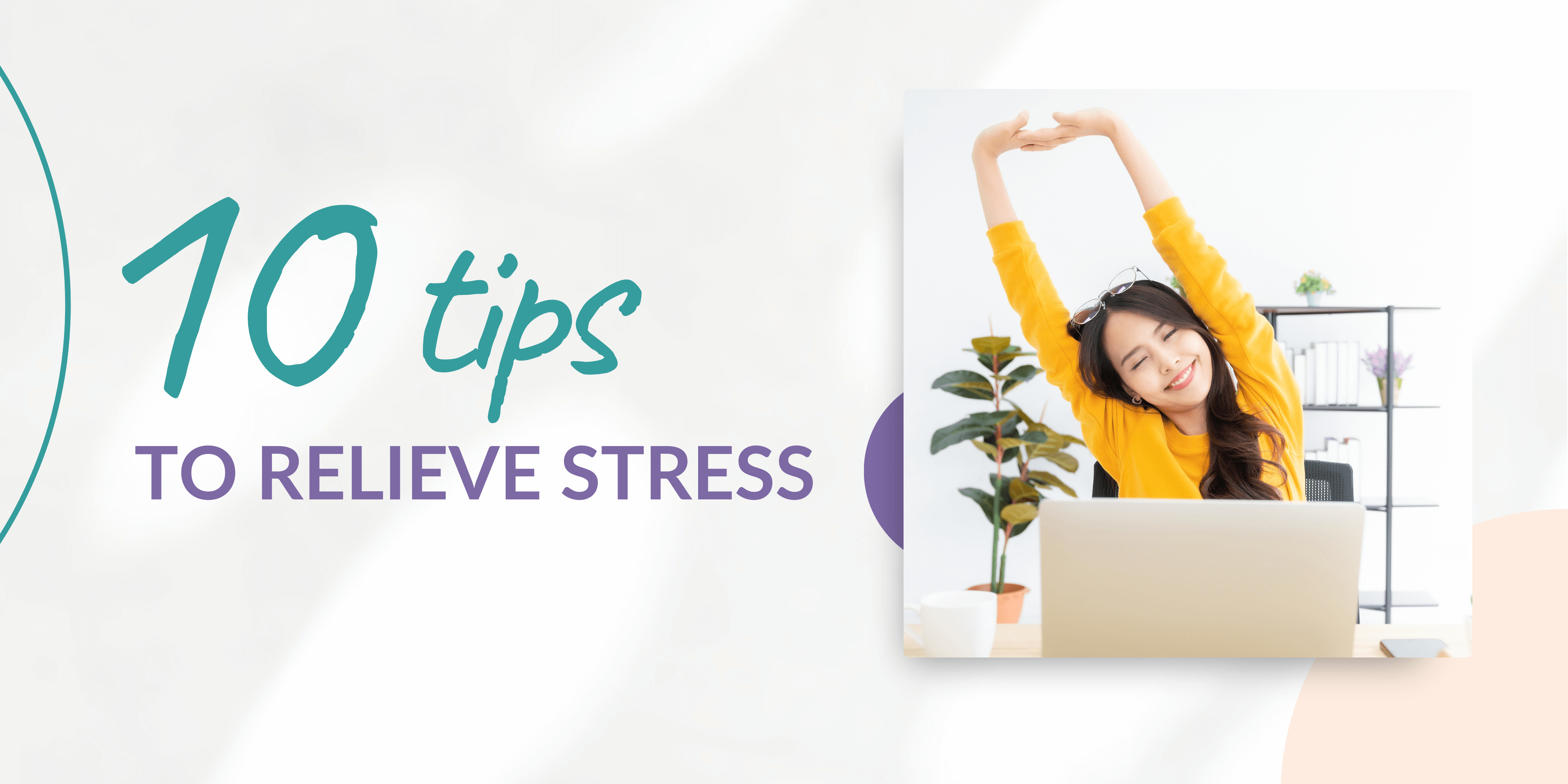Whether it’s an upcoming deadline or a major family crisis, everybody experiences stress in their lifetime.
Table of Contents
In recent years, stress levels have reached unprecedented heights, with more than 84% of adults in 2021 reporting they experienced “prolonged stress.” Recent political and economic uncertainties have only made the crisis worse.
This exposure to long-term or acute stress can take a toll on your physical and mental well-being. According to The American Institute of Stress, more than 70% of people say that stress affects their physical and mental health.
While you can’t always control the stressors in your life, you can control how you respond. Before we get into stress-relief tips, let’s cover the basics of stress and how it could be impacting your life.
Importance of Managing Stress
Why is it so important to manage your stress? The answer is simple — stress can put your health at risk. Being stressed for too long can put your body at risk of developing conditions like:
- Heart disease
- High blood pressure
- Irritable bowel syndrome (IBS)
- Obesity
- Alzheimer’s
Stress doesn’t just pose a risk to your physical health. It can also wreak havoc on your personal life. When you’re under too much pressure, it can take a serious toll on your mental health. You might notice that you don’t enjoy life the way you used to. It might even feel like things are spiraling out of control, making it a challenge to get through your day-to-day responsibilities.
It’s impossible to eliminate stress, but learning to manage and control it can help you live a balanced life. This can help protect your physical, mental, and emotional health for years to come.
Effects of Too Much Stress
When you’re under too much stress, you can feel it mentally and physically. Some common signs include:
- Headaches and migraines
- Trouble falling or staying asleep
- Jaw pain or teeth grinding
- Changes in appetite
- Mood swings
- Difficulty concentrating
- Feeling overwhelmed
10 Tips To Manage Stress
While no one’s life can be completely stress-free, there are some strategies you can implement to manage your stress and start feeling better — mentally, physically, and emotionally.
Here are the top 10 techniques you can use to control your stress better:
1. Optimize Your Diet
What you eat and drink can affect how you feel, inside and out. Eating whole foods dense in nutrients is an essential part of regulating stress.
What’s more, stress may lead you to foods higher in fat and sugar. While this can provide momentary relief, it can be harmful to your physical and mental health in the long term.
2. Exercise Regularly
Physical activity is a key part of managing your mental health, and stress is no exception. Walking, jogging, strength training, hiking, or sports activities are just a few ways to relieve stress through exercise.
Consider trying exercises like yoga, Tai Chi, or Qigong to incorporate more mindful exercise into your routine. These practices combine light exercise with more mindful techniques like controlled breathing and meditation, making it a great way to relieve stress.
3. Avoid Drugs and Alcohol
While some people turn to drugs and alcohol as a quick fix for stress, relying on substances won’t provide relief. In fact, they can make your stress even worse. If overused, it can even lead to substance abuse.
If you’re struggling with substance abuse due to stress, you’re not alone. Talk to a practitioner with Sofia Health to get help.
4. Practice Relaxation Techniques
The right relaxation techniques can relax your body and mind in just minutes and impact your overall stress levels when practiced over the long term.
Try doing deep breathing exercises, practicing meditation, or working on progressive muscle relaxation. Whether you’re in a crowded room or completely alone, a few breathing exercises are an easy way to reduce stress. To learn more about mindful meditation and breathwork, find a specialist with Sofia.
5. Get Enough Sleep
While it might seem simple, getting enough sleep is the foundation of mental health. If you don’t give your mind and body the time to recharge, you might struggle to cope with stress. The symptoms of some mental health conditions, like depression or bipolar disorder, can be triggered by a lack of sleep.
6. Identify the Source
The key to stress management is identifying the source of stress in your life. While it’s easy to identify major issues — changing jobs, moving, or a divorce — stress can come from unexpected places. Even your own thoughts, feelings, and behaviors could be contributing to your everyday stress levels.
One way to identify the stressors in your life is by keeping a stress journal. Think about what might have caused your stress, how it made you feel, and how you reacted.
7. Take a Break
Sometimes all it takes to break out of a stress cycle is separating yourself from your circumstances. You could go to a new location, like a vacation, or unplug from social media and focus on yourself for a while.
8. Try Biofeedback
Biofeedback is a method of tracking your body’s physiological responses in real-time. Using machines that measure heart rate, muscle tension, and brain waves, biofeedback helps you better understand how your body responds to stress.
Once you know how your body is currently functioning, you can make more informed decisions about managing that stress. For example, you can tell which relaxation techniques (like deep breathing, visualization, or meditation) are the most effective.
You’ll need a health professional to explain what the readings mean and help you use that information to lower your stress. Not sure where to look? Find a biofeedback professional to work with on the Sofia Health platform.
9. Explore Guided Imagery
Guided imagery is a relaxation technique that involves visualization. To explore guided imagery, close your eyes and walk yourself through a scene where you feel at peace. This could be your “happy place,” a location you know well, or somewhere you find relaxing.
This technique essentially allows you to take a vacation in your mind and can replace negative thought patterns.
10. Talk It Out
All of these strategies can help you cope with stress, but nothing can replace professional guidance. Try talking it out with a health coach, life coach, counselor, therapist, or physician to develop a personalized strategy to help you reduce your stress levels.
Working with a professional can help you identify the sources of stress in your life. Once you know what’s causing you stress, they can help you manage the symptoms and start to improve your quality of life.
Getting to the Root of Your Stress
Stress is a normal part of life, but if it starts to interfere with your physical, mental, or emotional well-being, it’s time to take action to address it. Try taking small steps, like practicing meditation, getting more exercise, or keeping a stress journal. There are also countless professional resources to help get you to a better place.
If you’re ready to take the next step in stress management, the professionals at Sofia Health can help. Discover the right practitioner for you and book with them today.
More from Sofia Health
Check out the full episode of the Sofia Unfiltered podcast, "What is Energy Healing and How Can It Help Trauma? with Sara Garofalo", available on Apple Podcasts and Spotify.
Whether you prefer a subscription over live classes or want to shop for individual services, classes, or products, we have you covered. We're here to help you meet your wellness goals for physical, mental, emotional, and spiritual health. You can also take advantage of the services offered by one of the providers at the Sofia Marketplace.
Better yet, make a daily dose of wellness part of your routine. Sofia Prime offers both live classes and an extensive on-demand video library. Choose from high-quality offerings in wellness, nutrition, fitness, and meditation.
Start your two-week trial today and discover the difference that dedication and expert help can make.








